Key takeaways:
- Genealogy research combines online resources and local archives to uncover family histories, revealing connections to broader historical events.
- Family history enriches personal identity and highlights patterns of resilience and creativity passed through generations.
- Diversifying research techniques, like joining genealogical societies and leveraging social media, can lead to unexpected discoveries and deepen family narratives.
- Analyzing historical records, such as military documents and newspapers, can uncover hidden stories that provide insight into ancestors’ lives and challenges.
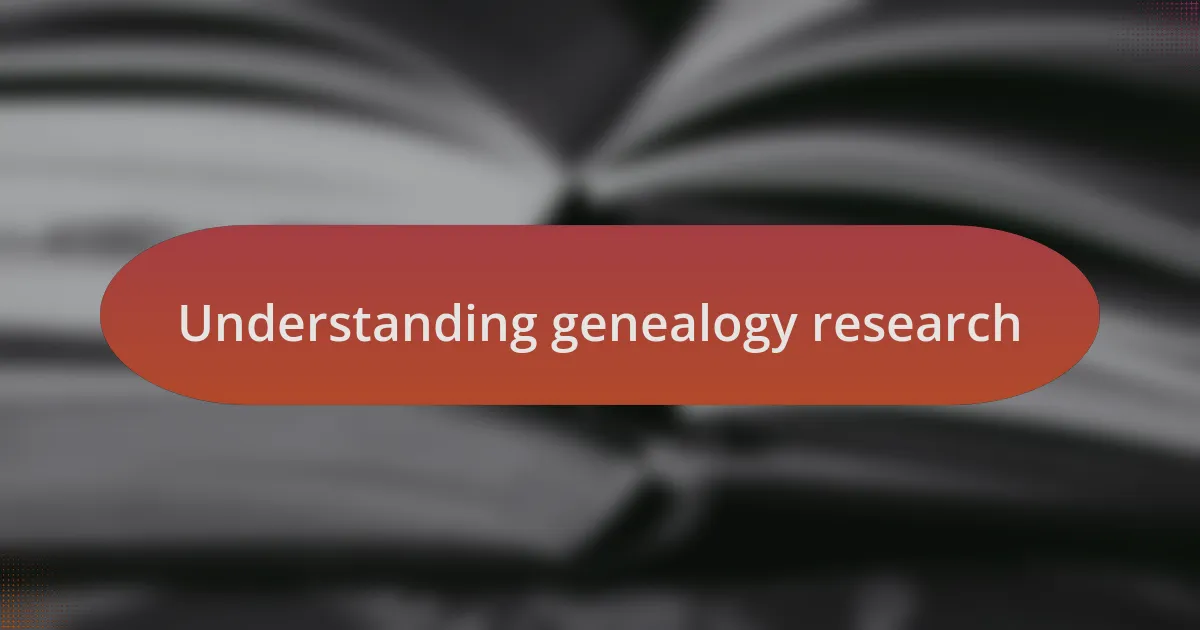
Understanding genealogy research
Genealogy research is like piecing together a puzzle where each piece tells a story. I remember my first time diving into an old family letter; the moment I held that fragile paper, I felt a rush of connection to my ancestors. What stories did they live through that I could uncover?
With genealogy, it’s essential to embrace both online resources and the thrill of exploration in local archives. When I ventured to my hometown’s library and uncovered census records, I could almost hear the whispers of my family’s past. Was it really possible that my great-grandfather had a completely different life than what I had known?
As I sifted through historical documents, I learned that each ancestor often linked to broader historical events, shaping their experiences. I found myself reflecting on how world events, like wars or migrations, impacted decisions made by my forebears. Isn’t it fascinating how understanding these connections can illuminate not just the past, but also our place in the world today?
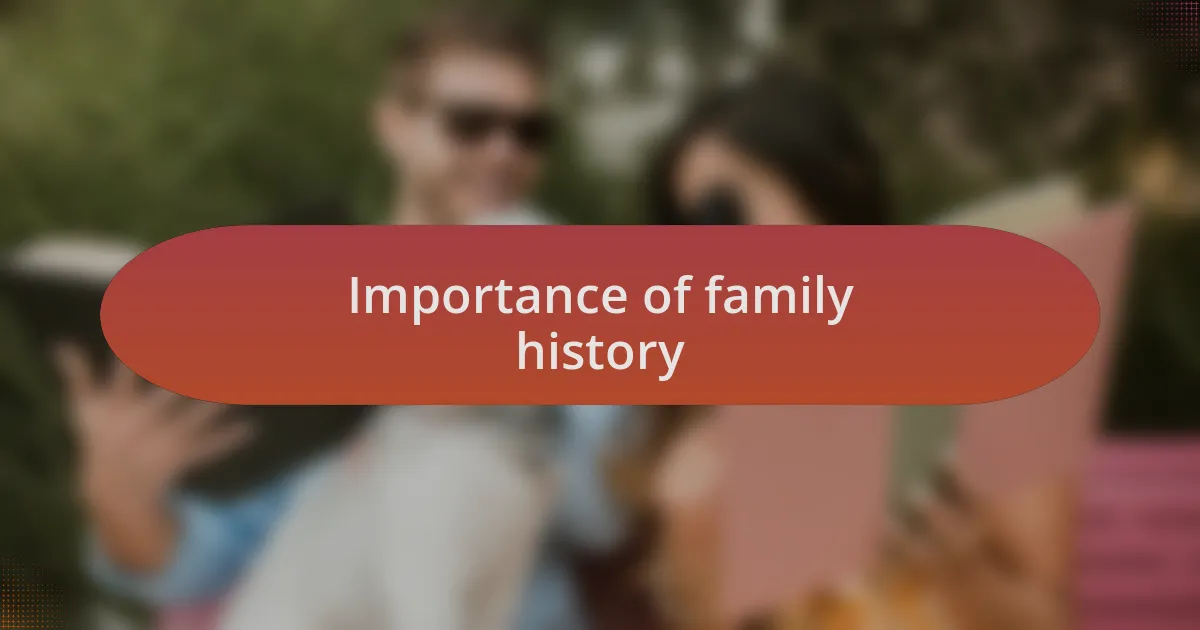
Importance of family history
Family history holds immense importance; it serves as a bridge connecting us to our roots. I often find myself reflecting on the moments when I discovered that my great-aunt was a suffragette. Learning about her courage not only made me appreciate the sacrifices my family made but also inspired me to advocate for the causes I believe in today. Isn’t it empowering to realize how our ancestor’s actions continue to echo in our lives?
Delving into family history can also enrich our understanding of our identities. I remember unearthing my grandmother’s immigration papers; reading them was like stepping directly into her shoes. Suddenly, her struggles made sense—I could visualize her journey across oceans in search of a better life. How often do we just skim the surface of our family stories without recognizing the weight they carry?
Moreover, tracing our lineage can highlight patterns of resilience, creativity, or challenges that we inherit. I once noticed a trend of artistic pursuits in several generations of my family. It dawned on me that these talents and passions might be an inherited legacy, waiting for us to nurture. Isn’t it intriguing how the threads of creativity can weave through generations, shaping who we are today?
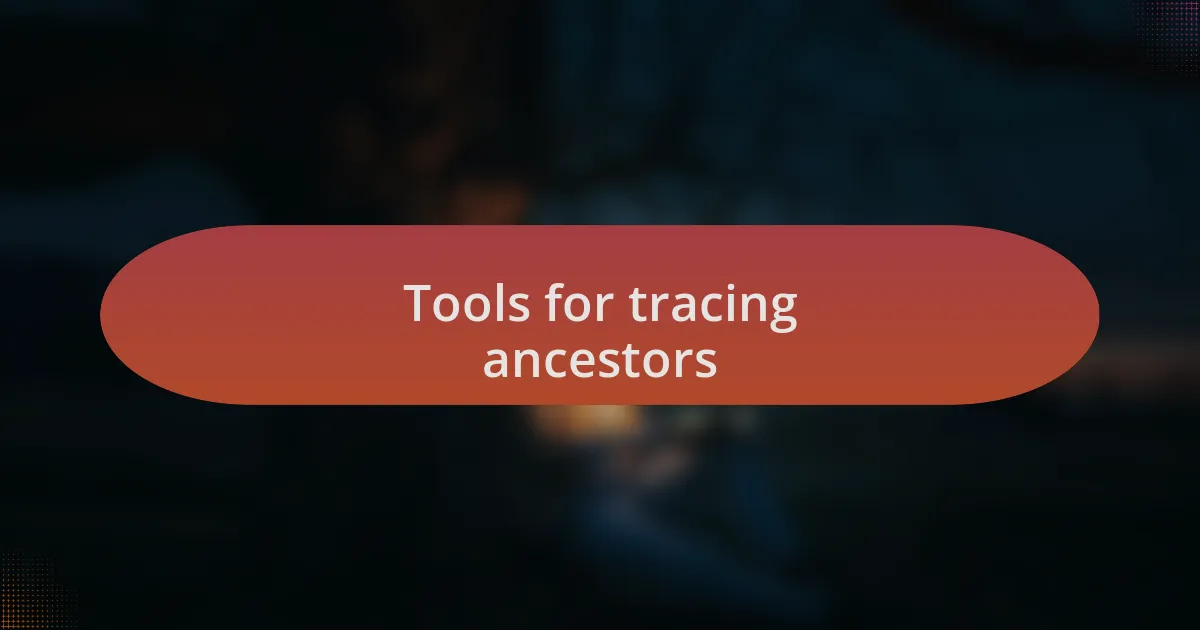
Tools for tracing ancestors
Tools for tracing ancestors can transform your journey into family history. One of my favorite resources is online genealogy databases, like Ancestry.com and FamilySearch. I remember the thrill of clicking through census records and discovering the names of long-lost relatives. How fascinating to think that each entry sheds light on a life that intertwined with mine!
Don’t overlook the power of DNA testing kits; they can reveal surprising branches of your family tree. When I tried one, it felt like opening a door to a world I didn’t know existed. Learning about distant cousins and their stories expanded my understanding of where I fit into history and sparked a curiosity that continues to drive my research. Have you ever wondered who else might share your bloodline?
Additionally, local libraries and historical societies often boast incredible archival materials, offering a glimpse into the past that complements digital research. I once spent hours sifting through old newspapers, which transported me to the everyday life of my ancestors. These snippets of their experiences help me connect the dots, making history feel alive and personal. Isn’t it amazing how a simple document can unfold stories that have shaped our present?
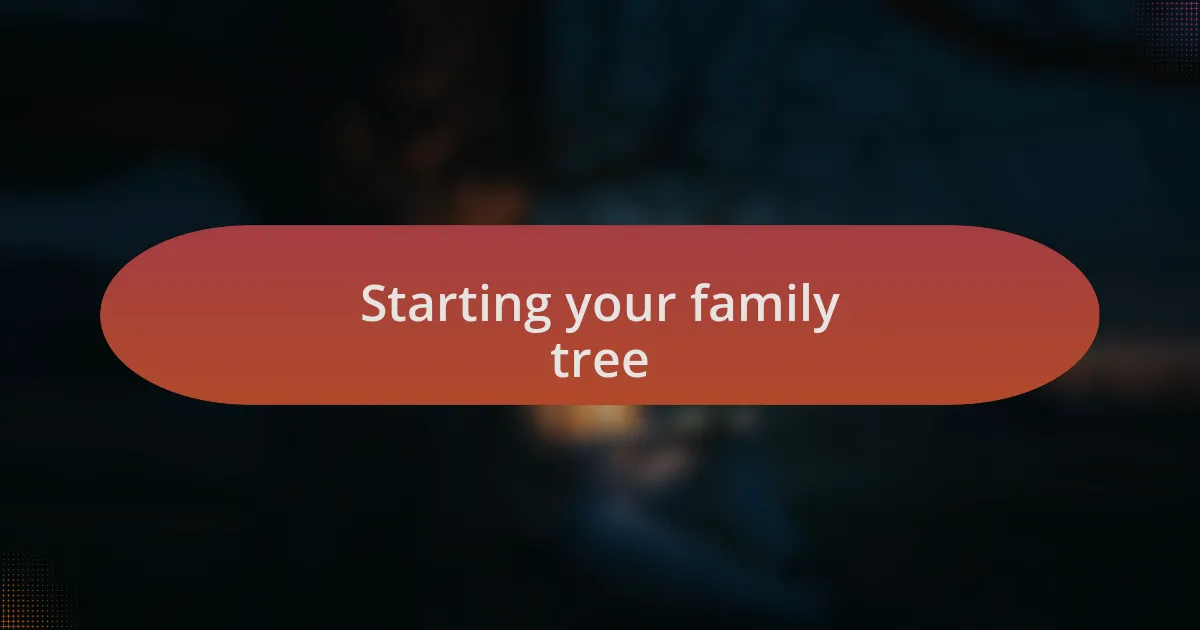
Starting your family tree
Starting your family tree can feel like stepping into a captivating mystery. I recall my first foray into this adventure—sitting at my dining table with a large piece of paper sprawled out in front of me, sketching out my immediate family. As I wrote down names, dates, and places, a sense of purpose washed over me; it was as if I was beginning to thread together a tapestry of lives that preceded me. Have you ever experienced that feeling of connecting the dots in your own lineage?
After mapping out what I knew, I turned to online databases to begin fleshing out the details. I remember the nervous excitement while waiting for the screen to load, heart racing at the thought that I might uncover a hidden ancestor. Those moments of discovery—like finding my great-grandmother’s name in a passenger list from the early 1900s—were indescribable. It made me wonder about her journey across the ocean and how it shaped my family’s path.
Don’t underestimate the importance of talking with relatives. My grandmother shared family stories that weren’t in any book or database, and those narratives added color to my family tree. I learned not just names, but also the struggles and triumphs that defined them. What if you could bring those stories to life, making history feel personal and relatable? This blend of research and storytelling is what truly enriches our understanding of where we come from.
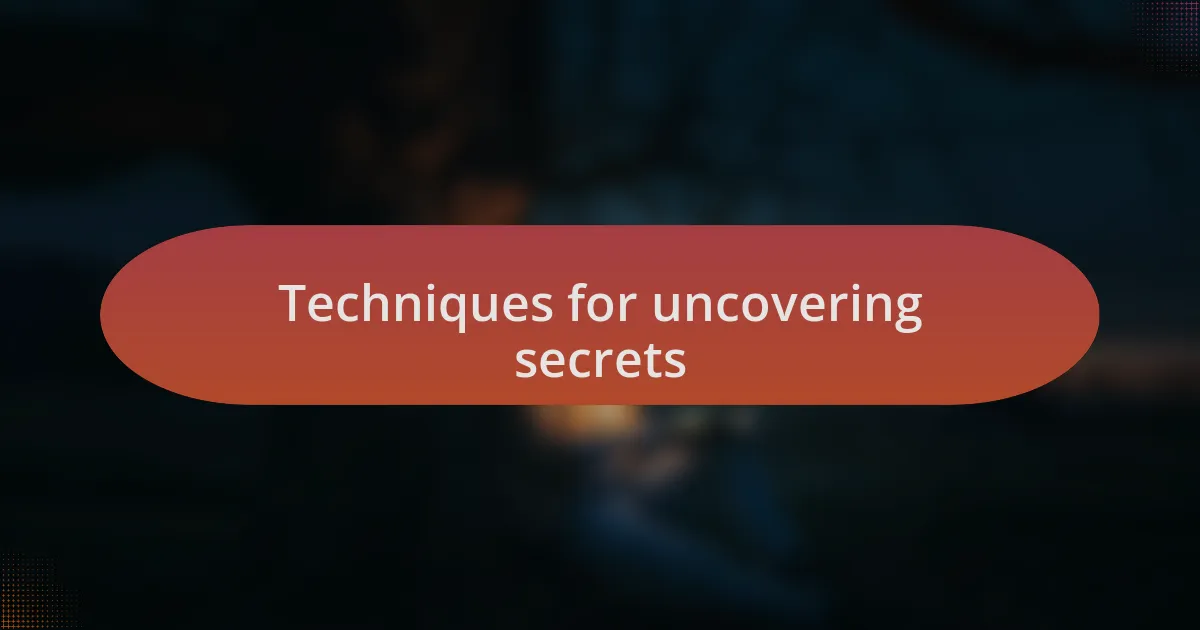
Techniques for uncovering secrets
I found that diversifying my research techniques significantly enhanced my quest for family secrets. Utilizing archive websites became a game-changer; I remember the thrill of scrolling through aged documents and stumbling upon a handwritten letter from a relative I never knew existed. How often do we overlook the power of primary sources in our research? Those tangible pieces of history can illuminate aspects of our ancestors’ lives that online summaries simply can’t capture.
Another effective method I discovered was joining local genealogical societies. At first, I was hesitant; the thought of mingling with seasoned researchers felt intimidating. But once I joined, I realized how rewarding it was to share insights and tips with others. Have you ever experienced the camaraderie that comes from pursuing a shared passion? The connections I made paved the way for some unanticipated discoveries, like a distant cousin who had documented family history back to the 1700s.
I can’t stress enough how personal connections can lead to unexpected surprises. When I reached out to distant relatives via social media, I was amazed at what I uncovered. One cousin shared a vivid photograph of our great-grandparents’ wedding day—an image that sparked a cascade of questions about their lives. Isn’t it fascinating how a single photograph can evoke a whole universe of stories? Each conversation revealed new layers to my family’s narrative, enriching my understanding of who we are.
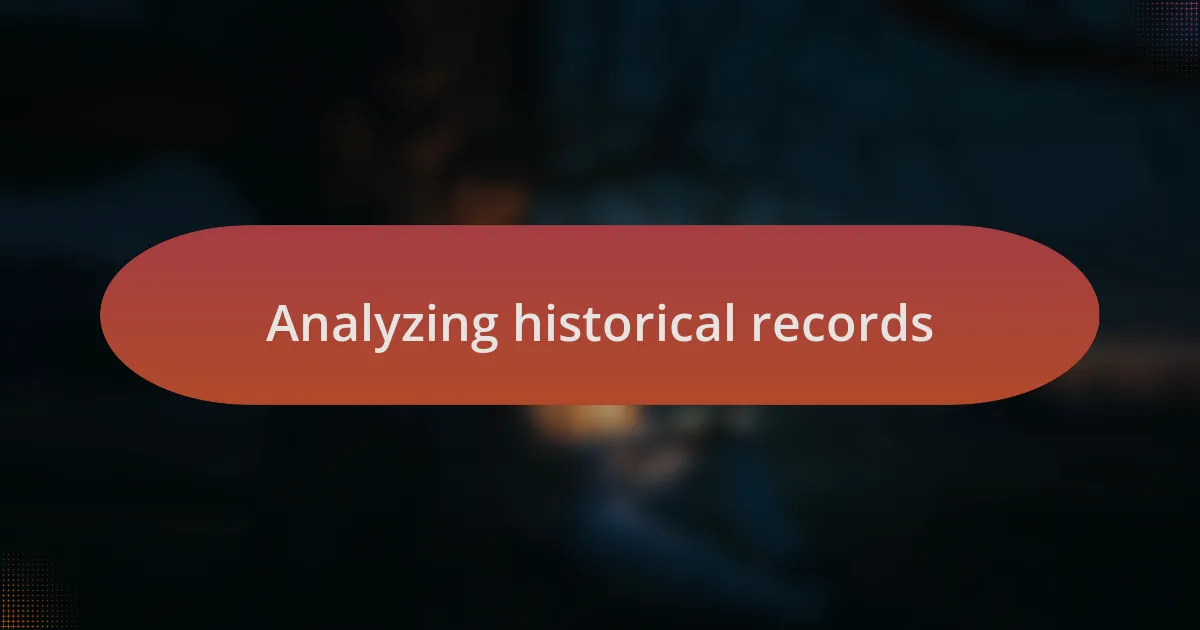
Analyzing historical records
When I first began analyzing historical records, I was overwhelmed by the sheer volume of information available. I learned that patience is vital; thoroughly sifting through old census records and military documents often revealed hidden stories. I still vividly remember discovering my great-grandfather’s military enlistment paperwork, which not only detailed his service but also provided insights into his character and the era he lived in. Isn’t it amazing how one piece of paper can offer a glimpse into a life lived long before our time?
Delving into historical newspapers became another favorite avenue for me. The simple act of reading old articles felt like stepping into a time machine, bringing the past to life. I once stumbled across a local newspaper report detailing a fire at my ancestor’s business—a dramatic event that changed their fortunes. How often do we stop to think about how our ancestors coped with crises? Understanding the challenges they faced adds depth to their stories and makes their struggles all the more relatable.
Moreover, I found that historical records can sometimes lead you down unexpected paths. While tracing my family tree, I discovered an obscure court case involving one of my forebears. The details of the case were both shocking and enlightening, revealing both family controversies and resilience. Have you ever unearthed a record that reshaped your understanding of your ancestry? Those revelations are often the moments that drive our curiosity further, connecting us to our heritage in ways we never could have anticipated.
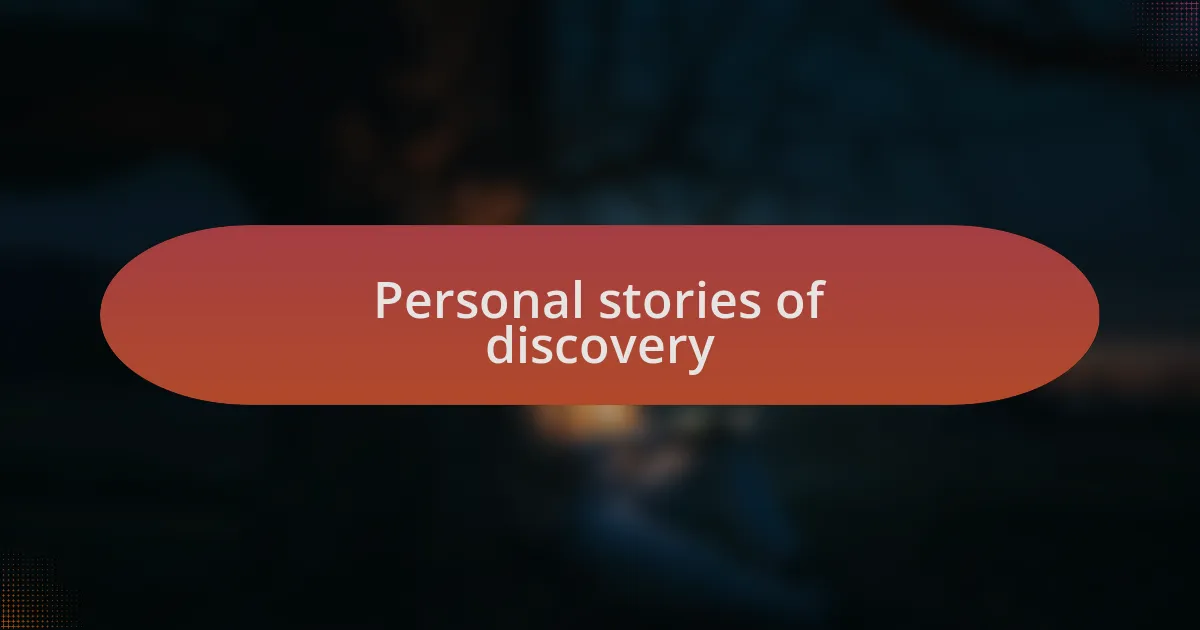
Personal stories of discovery
As I dove deeper into my family history, I encountered a photograph of my great-grandmother that brought my research to life. She had such a striking expression, and I found myself wondering what she experienced in her lifetime. What stories could she have shared if she were here today? That single image sparked a quest to learn more about her life, leading me to uncover tales of her migration journey and the challenges she faced in a new land.
One evening, while organizing my notes, I stumbled upon letters exchanged between my grandparents during World War II. Reading their words was like witnessing their love story unfold; it revealed their hopes, fears, and unwavering support for one another amid turmoil. What struck me the most was how the challenges of a war-torn world mirrored some of the struggles we face today, reminding me that the past isn’t just history—it’s a reflection of our shared humanity.
A particularly surprising discovery was a family recipe handwritten by my aunt, which included not just ingredients, but also vivid memories of holiday gatherings filled with laughter and love. As I tried to recreate that dish, I felt a profound connection to my roots. Isn’t it incredible how food can serve as a bridge to our past, keeping our ancestors’ legacies alive in such a tangible way? It made me realize that these personal stories are the soul of genealogy, offering insights that facts alone cannot convey.